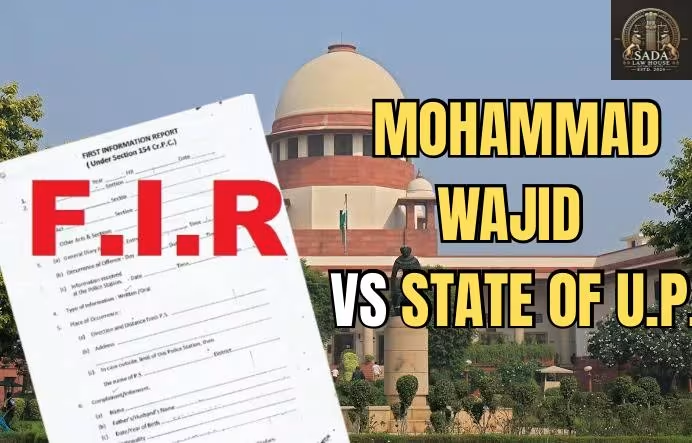MOHAMMAD WAJID VS STATE OF U.P. (2023)
- PRABHAT KUMAR BILTORIA
- 16 October, 2025

Introduction
In this case, an FIR against Mohammad Wajid and others under Sections 395, 504, and 506 of the IPC was quashed in connection with a land dispute in Saharanpur, Uttar Pradesh.
After the Allahabad High Court refused to dismiss the FIR on the grounds that it revealed cognizable offences, the matter reached the Supreme Court. The appellants contended that the FIR was politically motivated, abusive of the criminal process, and factually improbable. The Supreme Court examined whether the FIR warranted intervention under its inherent powers.
Facts of the Case
The FIR (No. 224/2022) was lodged at Police Station Mirzapur, Saharanpur on September 19, 2022, based on a complaint by Ram Kumar.
The allegations included:
Mohd. Iqbal invited the informant and his brother to discuss a property dispute (Khasra No. 256/1).
Upon arrival at Iqbal’s house, Wajid (Iqbal’s son) and 10–15 others:
Assaulted them,
Demanded ₹2 lakh at gunpoint,
Forced them to sign blank stamp papers, and
Threatened to kill their family if the matter was reported.
Key Observations
The FIR was lodged over a year after the alleged incident.
No specific date or time of occurrence was mentioned.
No medical evidence supported the claim of assault.
Civil litigation over the same property was already pending.
The accused had political connections with a former ruling party.
The Allahabad High Court declined to quash the FIR, holding that it disclosed cognizable offences under Sections 395, 504, and 506 IPC.
Issues of the Case
Whether the FIR disclosed essential ingredients to constitute dacoity under Section 395 IPC?
Whether a prima facie case existed for offences under Sections 504 (intentional insult) and 506 (criminal intimidation)?
Whether the FIR was filed out of political vendetta, amounting to abuse of process?
Whether the case fell within the parameters laid down in State of Haryana v. Bhajan Lal for quashing of FIRs?
Judgment
1. Dacoity Not Established
The Court examined the definitions of theft (Sec. 378 IPC) and robbery (Sec. 390 IPC), prerequisites for dacoity (Sec. 391 IPC).
It found no evidence of dishonest intent to remove property from lawful possession.
The informant’s claim of carrying ₹2 lakh to an opponent’s home lacked logic or corroboration.
Hence, Section 395 (dacoity) was not made out.
2. Political Vendetta and Abuse of Law
The accused were linked to a former ruling political party.
The informant was associated with the present ruling party.
Given existing civil disputes over the land, the FIR appeared to be politically motivated and a misuse of criminal law for civil pressure.
3. No Prima Facie Case under Section 504 IPC
Section 504 requires an intentional insult likely to provoke breach of peace.
The FIR merely alleged “abusive language” without specifying words or context.
Therefore, no offence under Section 504 was disclosed.
4. Weak Allegation under Section 506 IPC
Threats like “will kill family” were vague and uncorroborated.
The Court held that Section 506 IPC was only weakly attracted and insufficient for prosecution.
5. Application of Bhajan Lal Principles
The Supreme Court applied the principles from State of Haryana v. Bhajan Lal (1992 Supp (1) SCC 335), holding that the case satisfied several grounds for quashing an FIR:
Allegations, even if taken at face value, did not disclose any offence.
Claims were inherently improbable.
FIR appeared to be filed with malicious intent or political grudge.
Conclusion
Invoking Article 136 of the Constitution and Section 482 of the CrPC, the Supreme Court quashed the FIR, emphasizing:
Criminal law cannot be weaponized for settling political or civil disputes.
Filing an FIR does not justify prosecution if the facts are vague, improbable, or motivated.
This judgment strengthens judicial oversight against abuse of criminal law, reinforcing protection for individuals against malicious litigation.
Significance:
This ruling serves as a vital precedent to prevent misuse of criminal proceedings in property and politically driven disputes.
Case Laws






